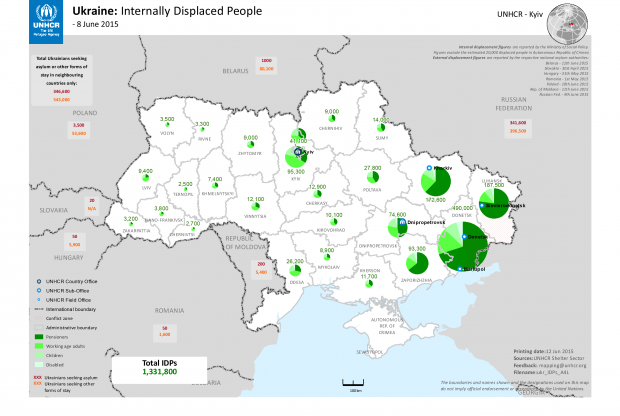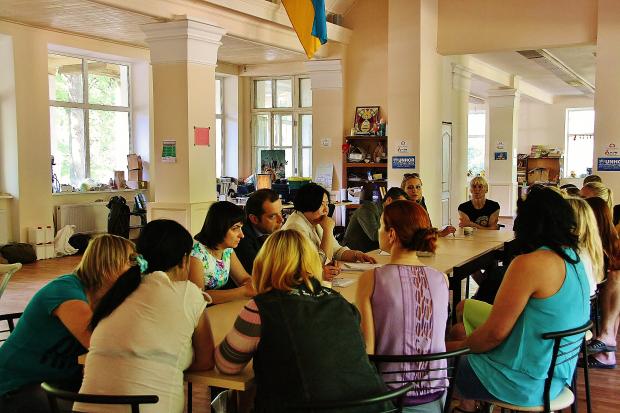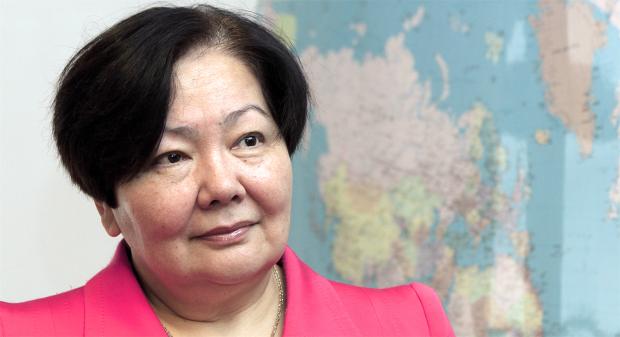Human trafficking in crisis situations: raising awareness in Ukraine
Since the start of the crisis in and around Ukraine, more than 1.3 million people have been displaced, a human tragedy with widespread social and economic implications, as families and individuals are uprooted and impoverished. Unfortunately, human trafficking is often rife in such situations, as breakdown in the rule of law and weakened border controls make people more vulnerable to exploitation by trafficking networks.
According to recent data from UNHCR, there are 74,600 displaced persons in Dnepropetrovsk and 172,600 in Kharkiv.
Organizations helping internally displaced persons (IDPs) are trying to assist new arrivals navigate the difficult labour market, and warn them about the risks of being trafficked and exploited.
Dopomoga Dnipra in Dnepropetrovsk is one such NGO. It operates a shelter in the city centre that can hold up to 120 people.
Iryna Bulyshova founded the centre last year together with four colleagues who were alarmed by the growing number of IDPs arriving in the city from eastern Ukraine.
It relies on donations from city residents, and has also received funding and equipment from organizations including UNHCR, USAID and Save the Children. The OSCE contributed 20,000 euros to pay for diapers, infant formula and other essentials.
Bulyshova said it is difficult for most of the new arrivals to find work, as they lack the necessary paperwork and skills to compete in the city’s crisis-hit economy. Dubious offers, promising enormous sums of money, can frequently be found in newspapers or online.
“Everyone is thinking of a better life,” she said adding that the situation on the ground is far from that.
Elena Goncharova, director of another NGO called Stantsia Kharkiv, said that unscrupulous employers had taken advantage of some IDPs, initially providing them with jobs and then finding excuses not to pay their salaries.
We advise people, for example, never to surrender their passports, as this is clearly fraud.
Elena Goncharova Director of the NGO called Stantsia Kharkiv
Goncharova’s organization has received grants to financially support IDPs who want to start small businesses and it is seeking donors to fund a system of free public transport allowing them to travel to their places of employment.
The Romashka centre in Kharkiv, which houses 250 people on the grounds of a Soviet-era summer camp, is led by directors Oksana Pogorelova and Vladimir Rozhkov. They are struggling to find work for the IDPs that fled Luhansk and Donetsk. They were able to offer about 20-30 jobs at the wooded camp for some arrivals, and others have found work at a ceramics factory in the city.
We have created a few jobs here, but most people are taking care of their children.
Oksana Pogorelova Director of the Romashka centre in Kharkiv
Improving human security
The OSCE’s Office of the Special Representative and Co-ordinator for Combating Trafficking in Human Beings is meeting with IDPs and working with the Special Monitoring Mission to Ukraine (SMM) to raise awareness among the monitors and enable them to identify victims of human trafficking.
The critical help provided by these organizations must be highlighted. The people I met have undergone great hardship, but now they are being given the opportunity to rebuild their lives.
Ambassador Madina Jarbussynova OSCE Special Representative and Co-ordinator to Combat Trafficking in Human Beings
On a trip to Dnepropetrovsk and Kharkiv from 18 – 22 May, Special Representative and Co-ordinator for Combating Trafficking in Human Beings Madina Jarbussynova met with the staff and residents of the Dopomoga Dnipra shelter as part of her awareness-raising efforts. She spoke with officials in both cities and also visited the Stantsia Kharkiv aid distribution centre and the Romashka shelter.
“The critical help provided by these organizations must be highlighted,” she said. “The people I met have undergone great hardship, but now they are being given the opportunity to rebuild their lives.”
Ambassador Jarbussynova stressed that it is vital to improve human security in the region, given the growing number of IDPs and the risks they face. In a meeting with the Special Representative, officials in Kharkiv reported that there have been 14 cases of trafficking for sexual exploitation this year involving 21 people, and some of these are IDPs from Luhansk and Donetsk.
With close to 500 monitors on the ground, the SMM is ideally placed to publicize the dangers of human trafficking among populations at risk and also potentially identify situations where this crime could occur. Ambassador Jarbussynova held information sessions for monitors in Kharkiv and Dnepropetrovsk, and in April she led a two-day training session for the SMM in Kyiv.
“It is vital to improve human security in the region and enhance capacities to monitor the situation on the ground,” the Special Representative said. “That is why I plan to travel frequently to Ukraine to engage with high-level authorities, help build trust among relevant stakeholders and prevent an increase in trafficking in human beings.”





